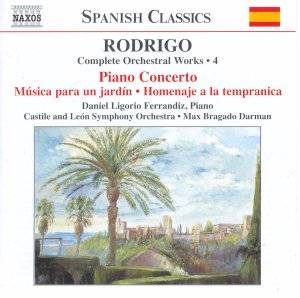This confirms my favourable findings on volume three
in this series. The music is unfamiliar but probing and pleasing. Rodrigo's
melodic, sharp-focus Hispanic impressionism paints in clarity and delicacy.
The Preludio looks towards the Alhambra
in a shimmer of colours suggestive of the brilliance of Frank Bridge
and Eugene Goossens. The Musica para un jardin (a depiction
of the seasonal life of Madrid's El Retiro park) is similarly subtle
but surprisingly avant-garde in feeling in the case of its own first
movement. The Homenaje has a seriously tragic momentum.
Juglares is Rodrigo's first orchestral work - smiling,
placid and ferial though it too rises to a powerfully tragic moment.
Not for the first time does the music stand in tribute to Petruchka's
Easter Fair.
The 1990s revision of the 1942 Concierto Heroico
may well have shorn the work of some of its more transfigurational
material. The Naxos disc gives us Joaquín Achúcarro's
version which was premiered in 1996 in Valencia. Only in the torrid
steady intensity of the great Largo do we glimpse the composer
of the Aranjuez concerto. The work dates from the turbulent days
of 1942 and is dedicated to the Roman ruins of the town of Sagunto in
the province of Valencia. Sagunto was Rodrigo's birthplace. There are
some moments of legendary vision and at those times we can perceive
echoes with the contemporary and 1930s works of Ivanovs (Atlantis),
Ireland (Legend) and Bax (Saga Fragment). Much of the
rest of the work refers to Prokofiev, Rachmaninov, Stravinsky (a little),
Bach, Beethoven (a real pesante in the finale) and the primitive
brass writing of the early masters of the Iberian renaissance.
Attractive if not quite in the same league as volume
3. I would now like to hear the original version of the Heroico as
recorded by EMI in their complete Rodrigo edition.
Rob Barnett
